
L-R: Head of Service, Ekiti State, Mr. Bunmi Famosaya, Ekiti State Governor, Dr Kayode Fayemi; Deputy Governor, Prof. Modupe Adelabu; and Keynote Speaker, Prof. Dipo Adamolekun; and Head of Service, Ogun State, Mrs. Modupe Adekunle; with them are, Director General, Develpoment Agenda for Western Nigeria (DAWN) Commission, Mr. Dipo Famakinwa; and South West Coordinator, DFID, Mr. Sina Fagbuaro, (Back row), during the 5th Summit of Heads of Service from the South West Geo-Political Zone, in Ado-Ekiti.
Ekiti State Governor, Dr Kayode Fayemi, has stressed the need to rediscover the role of the civil service as the creative hub of policy making and implementation, saying that the country won’t work if the civil service does not work.
The Governor who declared this at the opening of the 5th Summit of Heads of Service of South West States in Ado-Ekiti on Wednesday, said the country needs a crop of bureaucrats who are highly dedicated in order to achieve policy objectives and keep governance focused on real issues of development.
Dr Fayemi while stating that the civil service must be de-politicized and run as a meritocracy, said that people should not see the public service as “an irrelevant organization filled with slothful errand boys and girls of politicians” because it is the engine of governance and the fulcrum of policy implementation.
“It is imperative for us to recover the meaning of the civil service as the matrix of policy design and execution. It is the custodian of institutional memory and the engine of governance. By design, it is the technocratic hub of the State. This notion of the public service has been lost for decades and needs to be restored. Public servants regardless of how high or low their station, are the preservers of the common good”, he said.
Fayemi added that the effectiveness of politicians and public servants can only be measured by the increase in people’s level of access to public goods which he described as a barometer by which the health of the community is ascertained.
While speaking on the benefits of Regional Integration to the people, the Governor noted that a remote central authority cannot provide the public goods to the people not only because it lacks the capacity to do so but also because most of the national developmental objectives fall within the purview of State rather than Federal government.
He explained that the current “hybrid unitary-federalism” has condemned the grassroots to permanently anticipate the “charitable largesse of a distant central government” hence the inability of most Nigerians to yet feel the impact of democracy since its return 15 years ago.
Governor Fayemi, who stated that it is easy for citizens to hold their immediate government responsible where they feel its work is not commensurate with their investments, recalled the benefits reaped by citizens under the regional government of the Western Region led by the late sage, Chief Obafemi Awolowo.
While blaming the country’s woes on the military’s dismantling of the First Republic’s federal structure and the oil boom, the Governor asserted that history shows that Nigeria was better off in man y way under the First Republic’s federal model than the subsequent “unitarism of the military regimes and their civilian successors”.
He justified his stance with the country’s Per capita income of about $1,000 in 1966 and about $1,400 in 1973 which is presently at about $1,200; translating that an average Nigerian presently earns less than half of the income in 1966 and has less access to a functional educational system.
In his remarks, the State’s Head of Service, Mr Bunmi Famosaya said the Summit was aimed at providing a platform to properly implement the integration agenda of the South-West as well as engage a peer review mechanism that will facilitate a cross fertilization of ideas among the Heads of Service with a view to identifying the sgtrentgh of each State and apply same where necessary.
Famosaya stated that the civil service has emerged the most crucial institution of government for the delivery of public values even as government relies on it for the implementation of its programmes.
The Head of Service while commending the Fayemi administration for the premium it places on the workforce, asserted that the Governor has reinvigorated the State Public Service through the Civil Service Transformation Strategy and repositioned it to perform optimally.
Also speaking, the Head of Service, Ogun State, Mrs Modupe Adekunle commended Fayemi for the transformational strides recorded in the State; saying that Ekiti State has really been positively transformed compared to what it was when she visited the State in 1997.
Adekunle gave the Governor a pat on the back for boosting the morale of Ekiti workers; stressing that it is apparent that civil servants in the State can now raise their heads and boast to be civil servants.
The opening ceremony was attended by the Deputy Governor, Prof. Modupe Adelabu, state commissioners, World Bank Consultant, Prof. Ladipo Adamolekun, Heads of Service from the South West States, the South West Coordinator of the UK Department for International Development (DFID), Mr Sina Fagbenro-Byron, retired Heads of Service from the States and serving Permanent Secretaries among others.
Last modified: March 12, 2014
